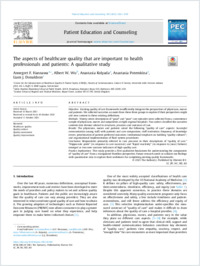The aspects of healthcare quality that are important to health professionals and patients : a qualitative study
- Hannawa, Annegret F ORCID Center for the Advancement of Healthcare Quality & Patient Safety (CAHQS), Facoltà di comunicazione, cultura e società, Università della Svizzera italiana, Svizzera
- Wu, Albert W. ORCID Johns Hopkins Bloomberg School of Public Health, Baltimore, Maryland, USA
- Kolyada, Anastasia Center for the Advancement of Healthcare Quality & Patient Safety (CAHQS), Facoltà di comunicazione, cultura e società, Università della Svizzera italiana, Svizzera
- Potemkina, Anastasia Center for the Advancement of Healthcare Quality & Patient Safety (CAHQS), Facoltà di comunicazione, cultura e società, Università della Svizzera italiana, Svizzera
- Donaldson, Liam J. London School of Hygiene and Tropical Medicine, London, United Kingdom
- 2022
Published in:
- Patient education and counseling. - 2022, vol. 105, no. 6, p. 1561-1570
English
Objective. Existing quality of care frameworks insufficiently integrate the perspectives of physicians, nurses and patients. We collected narrative accounts from these three groups to explore if their perspectives might add new content to these existing definitions.
Methods. Ninety-seven descriptions of “good” and “poor” care episodes were collected from a convenience sample of physicians, nurses and outpatients at eight regional hospitals. Two coders classified the narrative contents into themes related to structures, processes and outcomes of care.
Results. The physicians, nurses and patients raised the following “quality of care” aspects: Successful communication among staff, with patients and care companions; staff motivation; frequency of knowledge errors; prioritization of patient-preferred outcomes; institutional emphasis on building “quality cultures”; and organizational implementation of fluid system procedures.
Conclusion. Respondents primarily referred to care processes in their descriptions of “quality of care.” “Hippocratic pride” (in response to care successes) and “Rapid reactivity” (in response to (near) failures) emerged as two new outcome indicators of high-quality care.
Practice implications. This study provides a first qualitative fundament for understanding the components of “quality of care” from a triangulated frontline perspective. Future research needs to validate our findings with quantitative data to explore their usefulness for completing existing quality frameworks.
Methods. Ninety-seven descriptions of “good” and “poor” care episodes were collected from a convenience sample of physicians, nurses and outpatients at eight regional hospitals. Two coders classified the narrative contents into themes related to structures, processes and outcomes of care.
Results. The physicians, nurses and patients raised the following “quality of care” aspects: Successful communication among staff, with patients and care companions; staff motivation; frequency of knowledge errors; prioritization of patient-preferred outcomes; institutional emphasis on building “quality cultures”; and organizational implementation of fluid system procedures.
Conclusion. Respondents primarily referred to care processes in their descriptions of “quality of care.” “Hippocratic pride” (in response to care successes) and “Rapid reactivity” (in response to (near) failures) emerged as two new outcome indicators of high-quality care.
Practice implications. This study provides a first qualitative fundament for understanding the components of “quality of care” from a triangulated frontline perspective. Future research needs to validate our findings with quantitative data to explore their usefulness for completing existing quality frameworks.
- Collections
- Language
-
- English
- Classification
- Medicine
- License
- Open access status
- hybrid
- Identifiers
-
- DOI 10.1016/j.pec.2021.10.016
- ARK ark:/12658/srd1324966
- Persistent URL
- https://n2t.net/ark:/12658/srd1324966
Statistics
Document views: 142
File downloads:
- Hannawa_2022_Else_pec: 345
